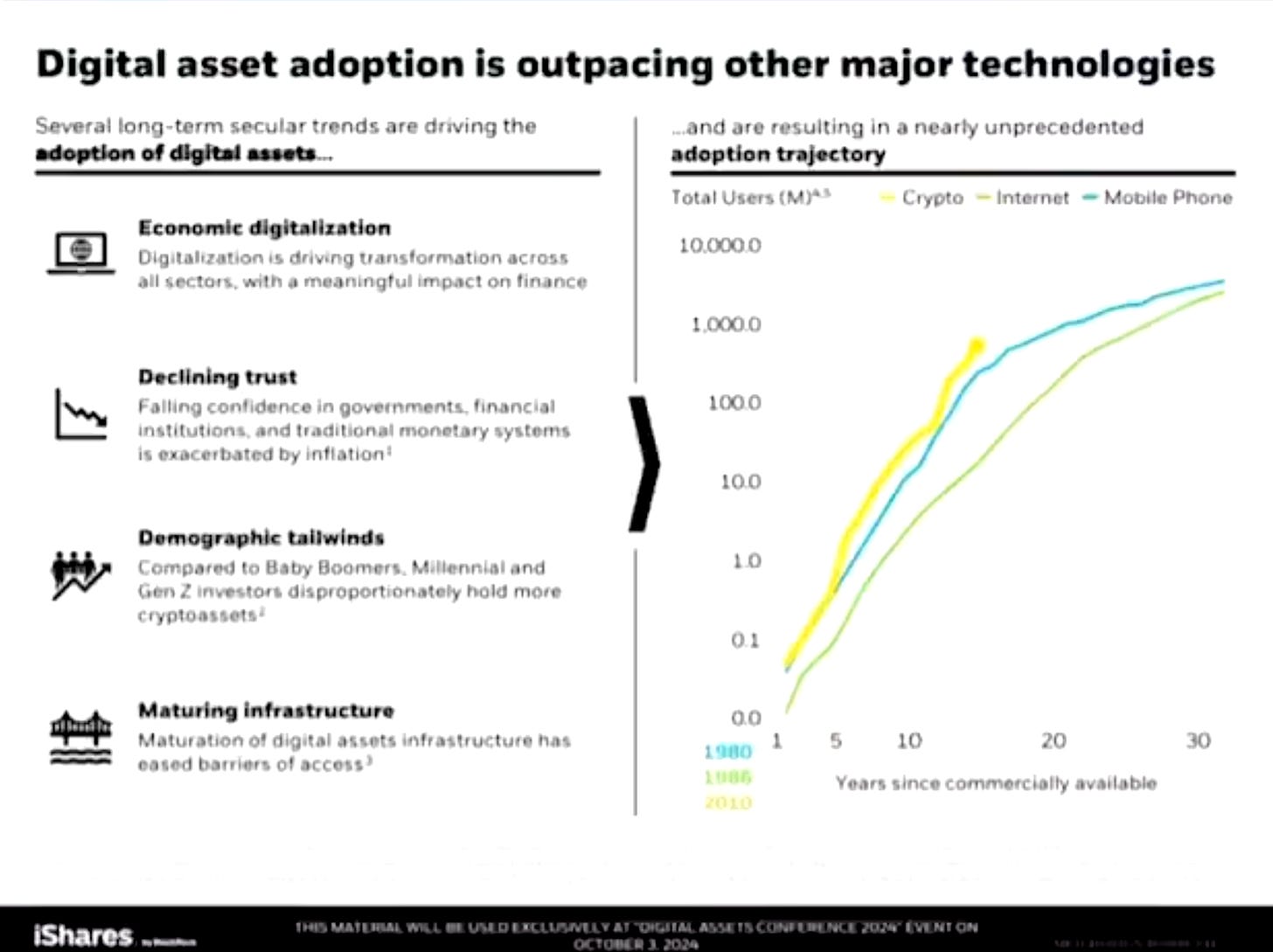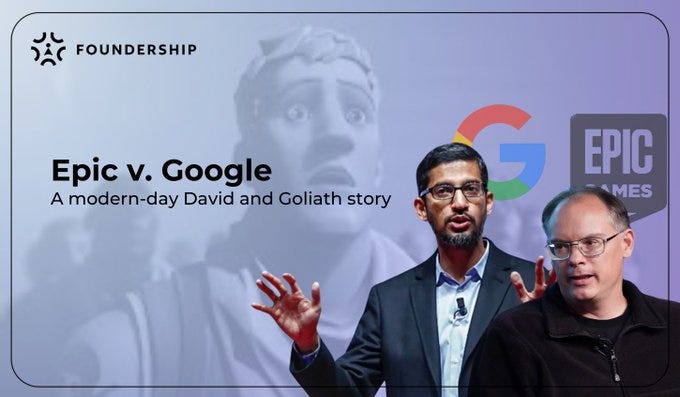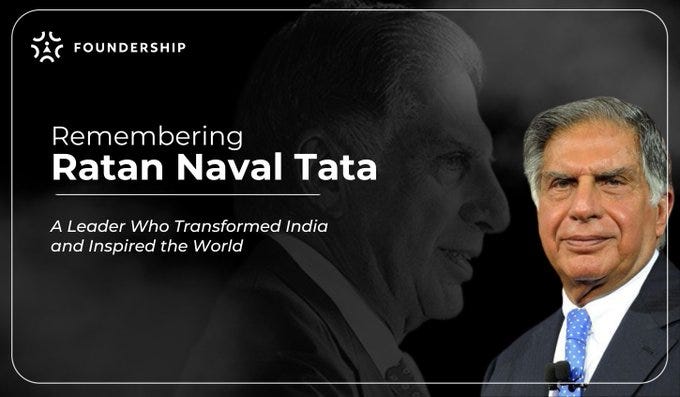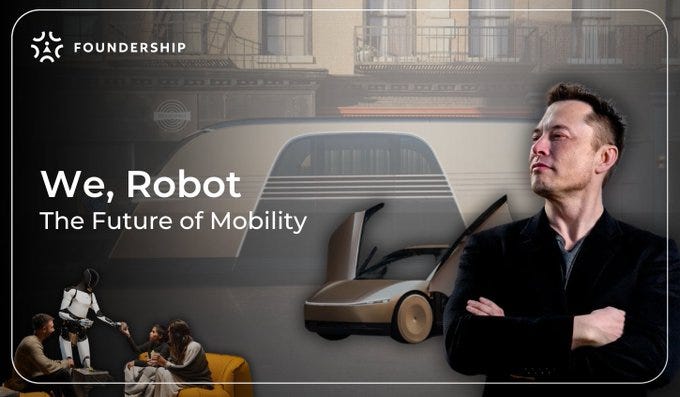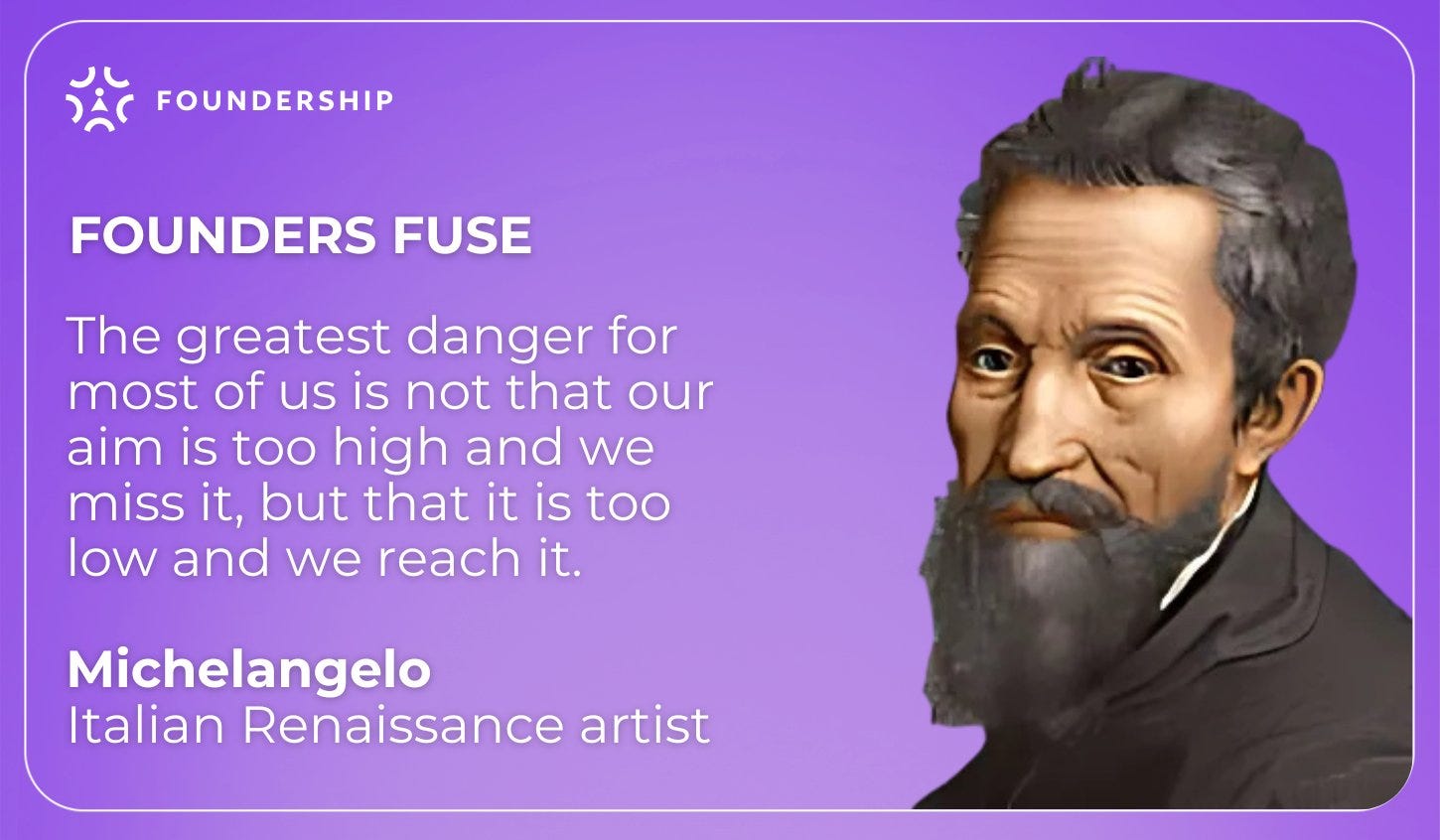Crypto is fastest vs. internet & smartphone, Epic vs. Google, Lessons from Zomato, Remembering Ratan Tata, Elon Musk's We - The Robot and weekly news
Weekly posts and thought leadership from Foundership for founders and investors are curated straight from Foundership's blog, video, podcast, social media, and special updates.
Welcome to Foundership Lighthouse!
Weekly posts and thought leadership from Foundership for founders and investors are curated straight from Foundership's blog, video, podcast, social media, and special updates.
Quick Summary:
In this post, we bring various topics relevant to founders and investors, including the mystery of Bitcoin's creator Satoshi Nakamoto and the implications of anonymity in innovation, leadership lessons from Zomato's CEO Deepinder Goyal, and the antitrust trial between Epic Games and Google. The importance of empathy in leadership, the challenges startups face in a competitive market, and the need for innovation and strategic thinking. Additionally, we reflect on the legacy of Ratan Tata and highlight Tesla's advancements in mobility technology, urging entrepreneurs to dream big and innovate. This post also covers recent news in the cryptocurrency space, including updates on Mt. Gox and legal issues involving Binance and FTX executives.
Did you think the internet and smartphones took over the world too fast? BlackRock says you'll love crypto.
Tweet: https://x.com/FoundershipHQ/status/1843657121629671528
Who is Satoshi
The question of who truly created it remains the ultimate mystery.
But the heart of this debate isn’t just about “who is Satoshi?” - it’s a reflection of how society views anonymity, innovation, and trust in a world driven by blockchain.
https://x.com/HBODocs/status/1841863278709915739
With HBO’s upcoming documentary claiming to reveal the true identity of Bitcoin's creator, the guessing game has reached new heights.
Bitcoin’s creator was a brilliant computer scientist with a revolutionary idea. They figured out how to create a decentralized digital currency that could transform the global financial system. What did they do next?
Satoshi Nakamoto released Bitcoin to the world - and then disappeared.
For years, names like Nick Szabo, Len Sassaman, and Adam Back have surfaced as possible contenders. But now, prediction markets like Polymarket are buzzing with speculation, creating a fascinating new way to watch this play out. Szabo, creator of Bit Gold - a precursor to Bitcoin - has surged in betting odds, while Sassaman's widow claims he’s been unfairly dragged into the conversation.
We're taught that founders should be the face of their companies, building personal brands and evangelizing their vision. But Satoshi chose a different path, one that offers some surprising insights:
Ideas can be more powerful than personalities. By stepping back, Satoshi allowed Bitcoin to evolve organically, free from the influence of a central figurehead. The strength of the idea propelled it forward.
Anonymity can fuel curiosity and engagement. The mystery around Satoshi's identity has arguably increased interest in Bitcoin and sparked countless discussions about its origins.
True innovation often comes from unexpected places. Whether Satoshi turns out to be Nick Szabo, Len Sassaman, or someone else entirely, it's clear they weren't a known quantity in traditional finance or tech circles.
Leadership sometimes means knowing when to let go. By ceding control of Bitcoin's development, Satoshi ensured it would become a truly decentralized, community-driven project.
As founders, we can draw inspiration from this unconventional approach. While building a public profile has its merits, there may be times when stepping back allows your creation to flourish in ways you never imagined.
The next time you're launching a new product or initiative, ask yourself: How can I let the strength of the idea shine through? Is there value in maintaining some mystery? And most importantly, am I prepared to let my creation take on a life of its own?
In the end, Satoshi's greatest innovation may not be Bitcoin itself, but the radical new model of founder-less leadership they pioneered. As we continue to speculate on their true identity, perhaps the most valuable question we can ask is not "Who is Satoshi?" but "What can Satoshi teach us about bringing world-changing ideas to life?."
Share this with your friends and connections!👇
Tweet: https://x.com/FoundershipHQ/status/1843511550046531913
https://x.com/i/status/1843511550046531913
Zomato: Great leaders find ways to stay connected with every aspect of their company's operations.
As a CEO, it's easy to lose touch with the ground reality of your business. However, great leaders find ways to stay connected with every aspect of their company's operations.
Zomato CEO Deepinder Goyal recently demonstrated this principle in a heartwarming move that offers valuable lessons for all entrepreneurs.
By wearing the uniform of a delivery partner and experiencing firsthand the challenges they face, Goyal demonstrated a crucial trait of effective leadership: empathy.
This action goes beyond traditional management practices and shows a deep commitment to understanding and improving the working conditions of frontline employees.
Goyal's experience at Ambience Mall in Gurugram revealed systemic issues that may have gone unnoticed from the executive suite. This highlights the importance of leaders stepping out of their comfort zones and immersing themselves in different roles within their organization.
The true test of leadership comes not just from gathering insights, but from acting on them. Goyal's public commitment to working with malls to improve conditions for delivery partners demonstrates how leaders can leverage their influence to drive positive change.
By sharing his experience openly on social media, Goyal displayed transparency and accountability – qualities that are essential for building trust with both employees and customers. This level of openness can significantly enhance a company's reputation and foster a culture of continuous improvement.
At Foundership HQ, we believe that such hands-on leadership approaches are crucial for startup success. They not only lead to operational improvements but also inspire loyalty and dedication throughout the organization.
As you build and grow your startup, consider how you can incorporate similar practices to stay connected with all levels of your business.
Great leaders don't just manage from afar – they roll up their sleeves and experience their business from every angle.
Share this with your friends and connections!👇
Tweet: https://x.com/FoundershipHQ/status/1843293990902501638
Linkedin: https://www.linkedin.com/feed/update/urn:li:activity:7249063694804930560
Epic vs. Google: A modern-day David and Goliath story
A modern-day David and Goliath story is unfolding before our eyes.
Epic Games, the creator of Fortnite, is taking on tech giant Google in an antitrust trial.
This legal battle isn't just about two tech companies; it's a case study in innovation, market dynamics, and the challenges faced by startups in a world dominated by tech behemoths.
At its core, this trial is about Google's alleged monopolistic practices in its Play Store. But for startups, it represents something much bigger: the struggle to innovate and grow in a market controlled by established players.
You're a brilliant app developer with a groundbreaking idea. You've poured your heart and soul into creating an app that could revolutionize how people interact with technology. But then you face a harsh reality: to reach most Android users, you must list your app on the Google Play Store and play by Google's rules.
One of the key issues in the trial is Google's 30% commission on app sales and in-app purchases. For a startup, this can be the difference between profitability and bankruptcy. Let's consider a hypothetical scenario:
Your startup creates a productivity app priced at $10. After Google's 30% cut, you're left with $7. Now factor in development costs, marketing expenses, and overhead. Suddenly, that $10 app might barely break even.
This trial raises a crucial question for the startup ecosystem: How do we balance the need for platforms like the Play Store with the imperative to foster innovation?
On one hand, these platforms provide invaluable infrastructure and reach. On the other, they can stifle competition and innovation through high fees and restrictive policies.
Lessons for Startups:
Diversification is key: Don't put all your eggs in one basket. Explore multiple platforms and distribution channels.
Understand the rules: Before diving into a platform, thoroughly research its policies and factor them into your business model.
Innovate strategically: Look for gaps in the market that big players might overlook. Your nimbleness is your advantage.
Build community: Cultivate a loyal user base. They can be your advocates in challenging times.
Stay informed: Keep an eye on legal and regulatory developments. They can significantly impact your business landscape.
The outcome of Epic v. Google could reshape the tech industry. For startups, it's a reminder that even giants can be challenged, and that innovation, persistence, and strategic thinking are the true currencies of the tech world.
Every tech giant was once a startup with a big dream.
Share this with your friends and connections!👇
Tweet: https://x.com/FoundershipHQ/status/1844004360537387220
Linkedin: https://www.linkedin.com/feed/update/urn:li:activity:7249771320190652418
Remembering Mr. Ratan Tata
Foundership mourns the loss of an extraordinary leader and philanthropist, Mr. Ratan Tata.
India, today, is stronger and prouder because of Mr. Ratan Tata. His legacy is not just in the businesses he built but in the millions of lives he touched and the moral compass he provided to future generations. His passing leaves an irreplaceable void, but his values and vision will continue to guide us all.
Though we mourn his loss, we celebrate a life lived with purpose, compassion, and a tireless commitment to uplift others. His legacy will forever inspire those who dare to dream of a better future for India and the world.
Share this with your friends and connections!👇
Tweet: https://x.com/FoundershipHQ/status/1844382219382686032
Linkedin: https://www.linkedin.com/feed/update/urn:li:activity:7250148153763479552
We, Robot - The Future of Mobility
Tesla's "We, Robot" event has once again pushed the boundaries of what we thought possible in transportation. As entrepreneurs and innovators, there's much we can learn from Elon Musk's latest unveiling.
The Cybercab isn't just a car; it's a complete reimagining of personal transportation. A world where your daily commute becomes productive time, where parking lots transform into parks, and where the concept of car ownership evolves into a shared, sustainable ecosystem. As founders, we must ask: What seemingly immutable aspects of our industries can we radically reinvent?
Tesla's approach to developing both the vehicle and the autonomous technology showcases the power of vertical integration. By controlling the entire stack, from hardware to software, Tesla can iterate faster and create a more seamless user experience. Consider how bringing key components in-house could accelerate your startup's innovation cycle.
While skeptics may question the timeline, Musk's ability to paint a compelling picture of the future drives innovation and attracts talent. As founders, having a clear, ambitious vision can be the catalyst that propels your startup forward. What's your equivalent of "a glorious future" for your industry?
The introduction of the Robovan alongside the Cybercab demonstrates how a single technological breakthrough can spawn multiple product lines. Consider how your core innovation might apply to adjacent markets or solve related problems.
Tesla's event reminds us of the delicate balance between generating excitement and delivering on promises. Musk's track record of missed deadlines for autonomous vehicles is well-documented. While bold claims can attract attention, it's crucial to back them up with tangible progress to maintain credibility. How can you strike this balance in your own venture?
As we witness these groundbreaking developments, let's ask ourselves: How can we apply these lessons to our own ventures? What seemingly impossible problems in our industries are waiting to be solved with a fresh perspective and unwavering determination?
The future of mobility is being written today. What chapter will you contribute to the story of innovation in your field?
Share this with your friends and connections!👇
Tweet: https://x.com/FoundershipHQ/status/1844728203879026941
Linkedin: https://www.linkedin.com/feed/update/urn:li:activity:7250494411367731201
Dare to dream big and reach for the stars! 🚀✨
Dare to dream big and reach for the stars! 🚀✨
#FounderFuse
Share this with your friends and connections!👇
Tweet: https://x.com/FoundershipHQ/status/1844728203879026941
Linkedin: https://www.linkedin.com/feed/update/urn:li:activity:7250898800985227264
Top news of the week
Mt. Gox Pushes Repayment Plan Deadline
Mt. Gox postponed the deadline to repay creditors to October 31, 2025.
Many rehabilitation creditors have not received repayments due to incomplete procedures.
Mt. Gox was once responsible for about 70% of global Bitcoin transactions.
The exchange collapsed in 2014 after security breaches, affecting 127,000 users.
Nigerian Court Denies Bail for Binance Executive
A Nigerian court rejected Binance executive Tigran Gambaryan's bail application.
The court instructed the prison to refer Gambaryan to a hospital for treatment.
Judge Emeka Nwite ruled that Gambaryan should remain in prison despite health concerns.
The judge stated Gambaryan would only be allowed to leave if his stay poses harm to others.
Ex-FTX Executive to Begin Prison Sentence
Former FTX Digital Markets co-CEO Ryan Salame was denied a request to delay his prison sentence.
Salame is set to begin serving a seven-and-a-half-year sentence.
Judge Lewis Kaplan rejected Salame's request to start his sentence on December 7.
The judge cited Salame's previous delay attempts and recent behavior in denying the request.
Vitalik Buterin Considered for Nobel Prize in Economics
Economists Tyler Cowen and Alex Tabarrok discussed potential 2024 Nobel Prize winners.
Cowen suggested Ethereum co-founder Vitalik Buterin as an "unusual pick" for the award.
The economists agreed Buterin deserved recognition for his contributions to monetary economics.
Cowen praised Buterin for building a platform and creating a currency.


